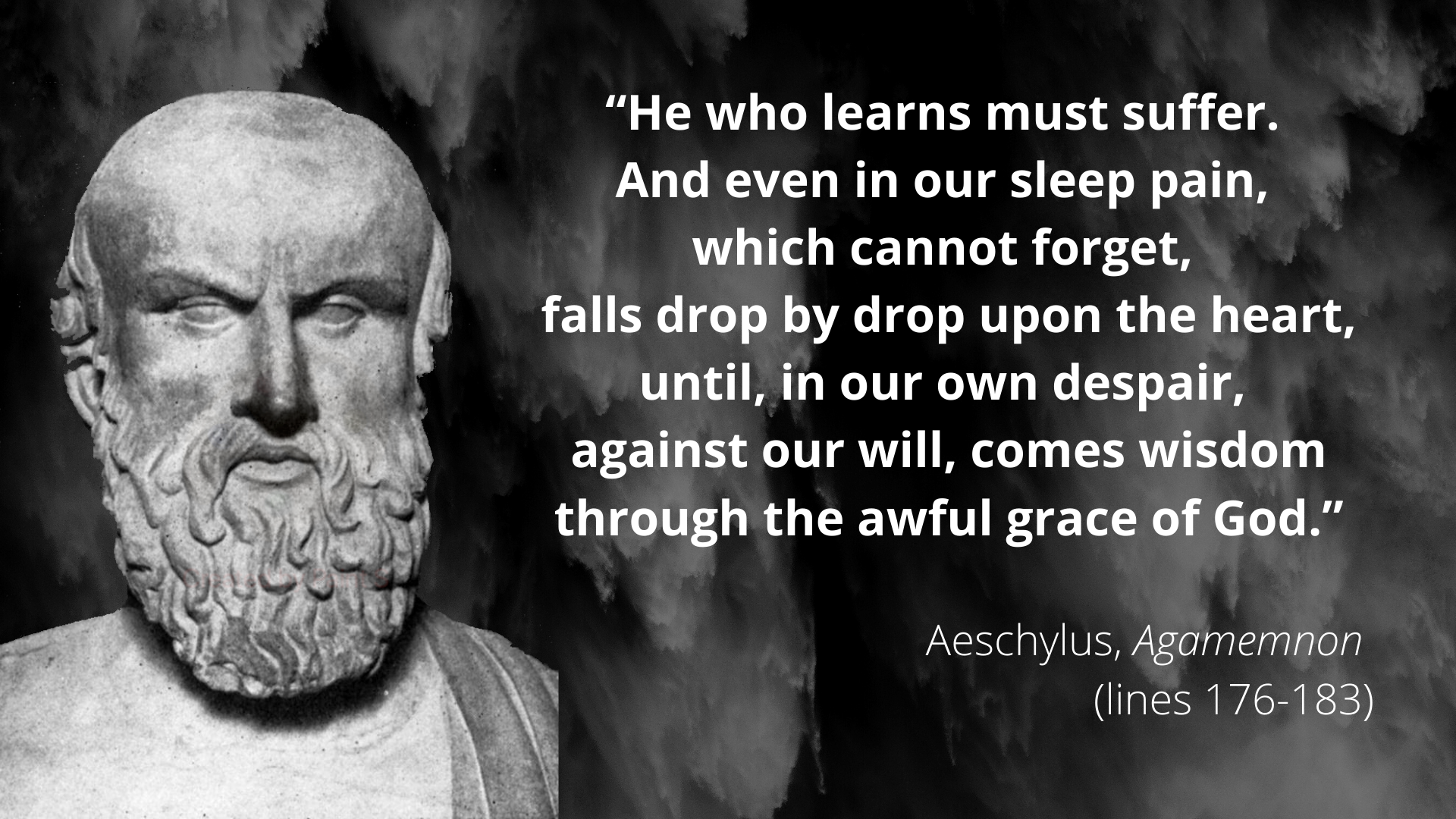“He who learns must suffer . . .”

Trivia question. In 458 BC, What production won the award for Best Picture, Best Original Script, and Best Director. Okay. You’re right. There were no Academy Awards at that time. But ancient Greece did hold the Dionysia festival every year in which the greatest playwrights of the age competed to see who could produce the best sequence of three dramas and a comedy. The winner that year was Aeschylus for his work entitled Oresteia.
Fortunately, the three tragedies that made up Oresteia were preserved and are still widely read, produced and discussed today. The themes and moral difficulties raised by these great plays continue to speak even to our own age.
Set at the end of the Trojan war, Agamemnon, The Libation Bearers, and The Eumenides raise age old questions of justice. The complexities of deciding right and wrong in the midst of conflicting values and ideals is clearly illuminated. The fact that “good guys” and “bad guys” are difficult to identify adds to the quality of character development. All in all, there is much to think about in this three play mini-series.
In my own view, one of the most profound insights to be found in the works is spoken by the Chorus relatively early on in the first tragedy, Agamemnon. Along about lines 177 – 178, they state, “Zeus’s law is first in all the world. The law is this: no wisdom without pain.”
Classicist Edith Hamilton translates the extended quote in this way.
“He who learns must suffer. And even in our sleep pain, which cannot forget, falls drop by drop upon the heart, until, in our own despair, against our will, comes wisdom through the awful grace of God.” Edith Hamilton, The Greek Way (1930), pp. 61 and 194 (Google Books)
From my perspective this line explains the great advance in thinking about justice that reaches its pinnacle in the final play, The Eumenides. After the audience has listened to wave after wave of murder and revenge, in this play they are faced with the awful prospect of one of the play’s heroes, Orestes, being hunted by the Furies because he killed his mother.
At this point in The Eumenides, Athena, the goddess of wisdom, courage, and justice, steps in. The cycle of blood and revenge must be stopped. But how, without violating the foundational value of justice? Athena devises what we would immediately see as a standard court trial with prosecution, defense, jury and judge. Both Orestes and the Furies have a chance to present their case. In the end, Orestes is saved and the bloodshed ends – all without offending the perception of justice.
Without the terrible pain leading up to the great trial, there likely would have been no need to disrupt the ancient status quo. Athena might never have stepped in. Revenge killing would have remained the norm. The system of justice in which right and wrong is weighed impartially by neutral parties might never have arisen. It was pain that led to wisdom.
I have found this formula to hold true in my own experience. I spend a great deal of energy trying to avoid discomfort. I don’t like things which irritate me and disrupt my tranquility. And I definitely dislike pain in all its forms — physical, psychological, and spiritual. Yet it is pain that generally makes me grow, learn, and become more human. It is pain that leads toward wisdom.
Rob Bell, in his October 27, 2019 podcast speaks to the positive value of pain while talking about the difficulties many US citizens are experiencing with the actions of President Trump and the current impeachment inquiry. He indicates that the anguish on both sides has caused formerly apathetic Americans to take a look at the Constitution, to study civics, to raise questions of patriotic principles, and to explore how our democracy might be improved.
Just look at the gubernatorial election in Kentucky a few weeks ago. In Fayette County (the county around Lexington), 20% more voters voted in 2019 than did in the 2015 election. What changed? The pain of the current political environment has transformed an uninspired electorate into an engaged people. It is pain that is making democracy stronger.
Now comes the challenge. If pain brings wisdom, will I embrace God’s awful grace? Something to ponder.

